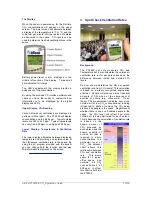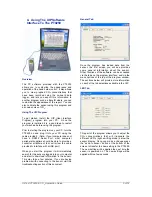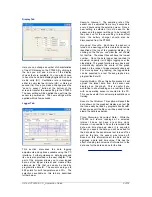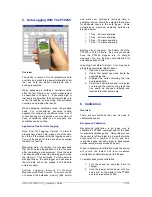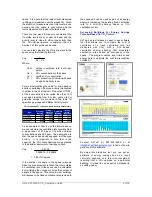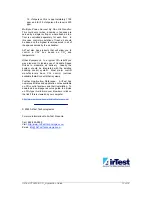
AirTest PT9250 & CO
2
Application Guide
7 of
12
5. Data Logging With The PT9250
Overview
The ability to record CO
2
and temperature data
over time and graph it is a powerful analytical tool
that can help you better understand how a
building is operated.
When assessing a building’s ventilation rates
often the first step is to do a spot measurement
as described in chapter 3. If unusually high or
low levels are detected, the next logical step is to
verify the reading by measuring concentrations
over time and graphing the results.
When assessing ventilation rates, the graphed
peak CO
2
concentration becomes readily
apparent for estimating ventilation rates. And if
concentrations are measured over a number of
days, consistency patterns of occupancy and
ventilation can be verified.
Application Tips For Data Logging
Note End Of Logging Period:
In order to
properly time stamp data, make note of the time
you turn off the sensor after the logging session.
You will be asked for this data when exporting
the data to a text file.
Managing Data:
If possible, it is recommended
that you download logged data to a text file soon
after completing a measurement. Once the data
has been exported, reset the data logger to erase
the memory. This will make it much easier to
manage files on the data logger and will ensure
that old data will not be erased if all 895 data
points are used.
Setting Logging Interval To Desired
Measurement Time Period:
To ensure you do
not exceed the database memory (895 points)
and write over previously recorded data, a
sampling interval should be selected that allows
for adequate space in the data logger. Some
guidelines on maximum sampling periods are
provided below.
•
1 Day – 2 minute sampling
•
2 Day – 4 minute sampling
•
5 Day – 10 minute sampling
•
7 Day – 15 minute sampling
Battery Life & Logging:
The battery life of the
PT9250 is 10 to 16 hours. As a rule you should
have the PT9250 plugged into it’s charger
whenever you are logging concentrations for
extended periods of time.
Graphing Text Data In Excel:
It is very easy to
graph the exported text files in Excel.
1. Open the Excel® program.
2. Under ‘file’, select open and locate the
exported text file.
3. Highlight the cells containing the time
and reading data.
4. Select the chart wizard and it will guide
you through the creation of a graph that
can easily be changed, labeled and
inserted into other documents,
6. Calibration
Overview
There are two methods that can be used to
calibrate the sensor.
Background Calibration
Background calibration is an easy way to
calibrate the PT9250 overnight without the need
for special calibration gases. Using this process,
the sensor is left overnight in an area that will be
unoccupied for a number of hours, and as a
result the space will likely drop to background
outside levels (always around 400 ppm).
When in background calibration mode the sensor
will record the lowest CO
2
level measured
overnight and calibrate this point to 400 ppm.
To activate background calibration:
1. Turn the sensor on and plug it into its
charger.
2. Hold the power button down until you
see “cal b” on the display of the PT9250
and then release the button.



